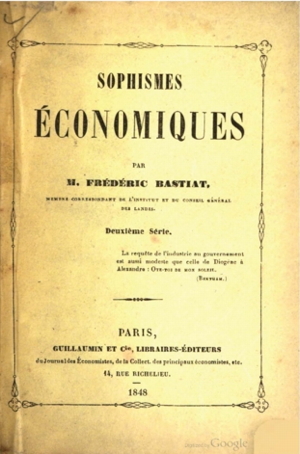A Paper given at the History of Economic Thought Society of Australia (HETSA) annual meeting, RMIT Melbourne, Victoria, July 5-8, 2011.
Online here.
This paper examines the origin, content, and form of Bastiat’s Economic Sophisms which will comprise volume 3 of Liberty Fund’s translation of his Collected Works. It is argued that in opposing the economic sophisms which he saw around him Bastiat developed a unique “rhetoric of liberty” in order to make his case for economic liberty. For the idea of debunking “fallacies”, he drew upon the work of Jeremy Bentham on “political fallacies” and Col. Perronnet Thomas on “corn law fallacies”; for his use of informal “conversations” to appeal to less well-informed readers, he drew upon the work of two women popularizers of economic ideas, Jane Marcet and Harriet Martineau.
Abstract: Frédéric Bastiat was best known in his lifetime for his opposition to the French government’s policies of trade protection and subsidies in the 1840s and for his opposition to socialism as a Deputy in the Constituent Assembly and then the National Assembly during the 1848 Revolution and Second Republic between 1848 and 1850. His works remained in print throughout the 19th century and were published by that indefatigable classical liberal publishing firm of Guillaumin. He took as his model for achieving economic change the work of Richard Cobden and the Anti-Corn Law League in Britain. Hence, Bastiat formed the Bordeaux Free Trade Association and then a national association based in Paris along with their affiliated newspapers and magazines, but his efforts were unsuccessful when the Chamber defeated a free trade motion in 1847.
Part of his tactics during this period was to debunk what he termed “economic fallacies” (or “sophisms”) which were widely held by both the public and the political elite concerning the benefits of government protection and subsidies. He published a large number of these “economic sophisms” between 1844 and 1848 in popular newspapers and magazines as well as in more academic journals like the Journal des Économistes. These were collected and published in 2 books during his lifetime and the editors of his posthumous Oeuvres complpètes had material enough for a third volume which was never published separately.
This paper examines the origin, content, and form of Bastiat’s Economic Sophisms which will comprise volume 3 of Liberty Fund’s translation of his Collected Works. It is argued that in opposing the economic sophisms which he saw around him Bastiat developed a unique “rhetoric of liberty” in order to make his case for economic liberty. For the idea of debunking “fallacies”, he drew upon the work of Jeremy Bentham on “political fallacies” and Col. Perronnet Thomas on “corn law fallacies”; for his use of informal “conversations” to appeal to less well-informed readers, he drew upon the work of two women popularizers of economic ideas, Jane Marcet and Harriet Martineau. One of Bastiat’s original contributions was the use of “Crusoe economics” where he simplifies the economic choices faced by an individual by describing how Robinson Crusoe might go about ordering his economic priorities and deciding what his opportunity costs are. Another original contribution is Bastiat’s clever use of short and witty economic “fables” and fictional letters written to political leaders. In many of these apparently “simple” fables Bastiat’s draws upon classical French literature (Molière and La Fontaine) as well as contemporary political songs and poems (written by “goguettiers” like his contemporary Béranger) to make serious economic arguments in a very witty and unique manner. Bastiat’s self-declared purpose was to make the study of economics less “dull and dry” and to use “the sting of ridicule” to expose the widespread misunderstanding of economic ideas. The result is what Friedrich Hayek correctly described as an economic “publicist of genius”.

